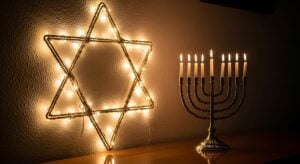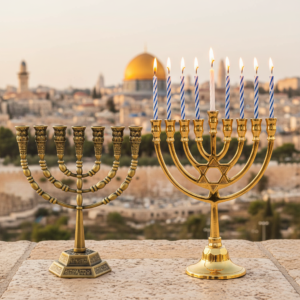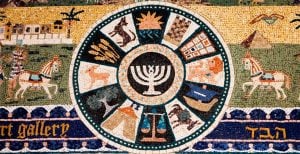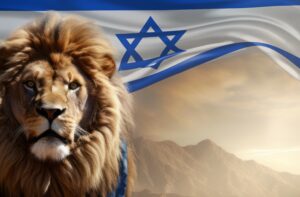Name: Vayishlach
Reading: Genesis 32:4 – 36:43
Haftarah: Obadiah 1:1 – 1:21
Parsha Summary – Vayishlach
Jacob Sends Gifts to Esau
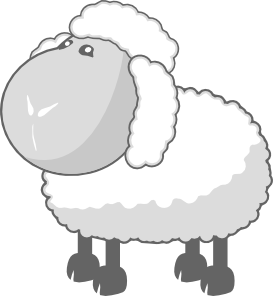 Jacob sends word to Esau in Seir that he has left Laban and is now a prosperous man. The messengers return and tell Jacob that Esau is on the way to meet him with 400 men. Jacob is afraid and divides his household into two camps so that if Esau attacks one, the other can escape. He prays for God’s protection from his brother.
Jacob sends word to Esau in Seir that he has left Laban and is now a prosperous man. The messengers return and tell Jacob that Esau is on the way to meet him with 400 men. Jacob is afraid and divides his household into two camps so that if Esau attacks one, the other can escape. He prays for God’s protection from his brother.
He separates off a generous number of animals from his flocks and herds to send ahead to Esau as a gift. During the night, he passes his wives, maids, and children across a stream to keep them safe, and stays alone on the other side.
Jacob and the Angel
When Jacob is alone, a man appears and wrestles with him until dawn. Neither wins, so the man touches Jacob’s thigh and dislocates it. They keep fighting until dawn breaks when the man tells Jacob to release him. Jacob says he will only release the stranger if he blesses him. He asks his name, then tells him that from now on, his name is Israel instead of Jacob because he struggled with God and succeeded. Jacob names the place Peniel because he saw God’s face there.
Jacob and Esau Reunite
 Jacob sees that Esau and his 400 men are near. He arranges his family in order: first the maids and their sons, then Leah and her children, and finally Rachel and Joseph. He overtakes them and bows down seven times as he approaches his brother. Esau runs to meet him and the two brothers embrace, kiss, and cry.
Jacob sees that Esau and his 400 men are near. He arranges his family in order: first the maids and their sons, then Leah and her children, and finally Rachel and Joseph. He overtakes them and bows down seven times as he approaches his brother. Esau runs to meet him and the two brothers embrace, kiss, and cry.
Jacob introduces his family to Esau. Esau tries to return Jacob’s gifts, but Jacob insists that he keep them as he has been blessed by God. Esau wants to travel together; Jacob says that he can’t as his children and flock are young and so must travel slowly. They part ways: Esau returns to Seir, and Jacob leaves for Sukkot where he builds an altar which he calls “the God of Israel”.
Dinah is Raped by Shechem
Dinah goes out to explore but is taken and raped by Shechem. He falls for her and asks his father to arrange their marriage. Jacob’s sons are furious that their sister was defiled. Shechem’s father Hamor asks Jacob for Dinah for Shechem, and for their other sons and daughters to marry; he wants their families to and properties to blend.
Jacob’s sons answer that they cannot intermarry with uncircumcised people. Hamor and Shechem want in on Jacob’s property so agree to circumcise every male in their city. While the men were recovering, Simeon and Levi entered the city and killed every male in revenge for Dinah’s rape. They take their wives, children, animals, and wealth for themselves. Jacob rebukes them but they defend their actions.
The Journey to Beth-El and Rachel’s Death
God tells Jacob to go and live in Beth-El. Jacob tells his household to put away their idols, change their clothes, and come to Beth-El where he will build an altar. They hand over their idols and jewelry and Jacob buries them under a tree. They travel and arrive safely, and Jacob builds an altar. God reaffirms that Jacob’s name is now Israel and that he will father a great nation.
They leave Beth-El for Efrat. Rachel goes into labor on the journey, and the midwife tells her it is a son. She names him Ben-Oni as she dies. Jacob names him Benjamin. Rachel is buried on the road on the way to Efrat.
Isaac Dies
Jacob’s sons are listed. Jacob goes to his father Isaac in Kiryat Arba. Isaac dies at one hundred and eighty years of age and is buried by his sons Jacob and Esau. The final chapter in this week’s Torah portion details Esau’s descendants.
Torah Takeaway
In this week’s Parasha, we read about one of the rare times God interacts with people in a solid, physical form. Even more unusually, there is no introduction: Jacob doesn’t know that he’s wrestling God until the very end of the strange encounter.
In Genesis 32:29, the mysterious stranger renames the patriarch with the simple statement:
Your name will no longer be called ‘Jacob’; rather, ‘Israel’ because you struggled with God and with people, and you prevailed.
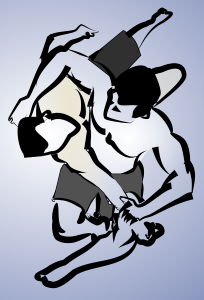 Until this point in Jacob’s story, we haven’t seen him struggle with the concept of or belief in God, so it seems like the physical interaction we just witnessed is the patriarch’s only altercation with Him.
Until this point in Jacob’s story, we haven’t seen him struggle with the concept of or belief in God, so it seems like the physical interaction we just witnessed is the patriarch’s only altercation with Him.
There’s an incredibly important lesson to be learned from these verses: perseverance.
Jacob wrestles with the “man” through the night, until daybreak. At dawn, the “man” sees that he cannot win out against Jacob, and presses against his thigh, causing a dislocation. Anyone who has ever suffered a dislocated joint will tell you that it is an excruciating pain: despite this, Jacob continues to fight.
Jacob epitomizes single-mindedness. For example, when scared of how his reunion with Esau will pan out, he is uniquely determined to protect his household: he divides and redivides his estate in an effort to preserve the people he loves and property he cherishes.
This ability to persevere is laudable: we should strive to complete that which we start, and aim to struggle through pain to complete the missions we have undertaken. After all, if a dislocated thigh didn’t dissuade Jacob from finishing his fight, what excuses do we have?

